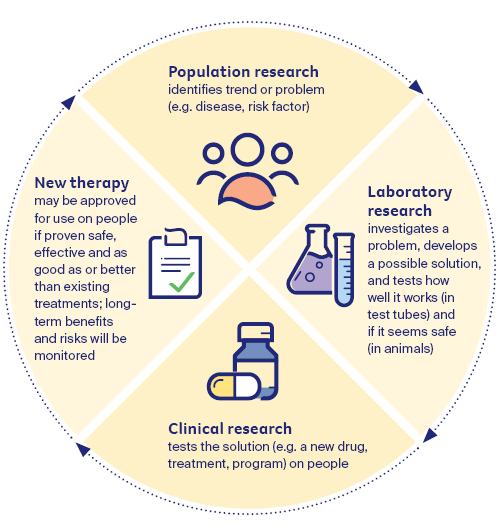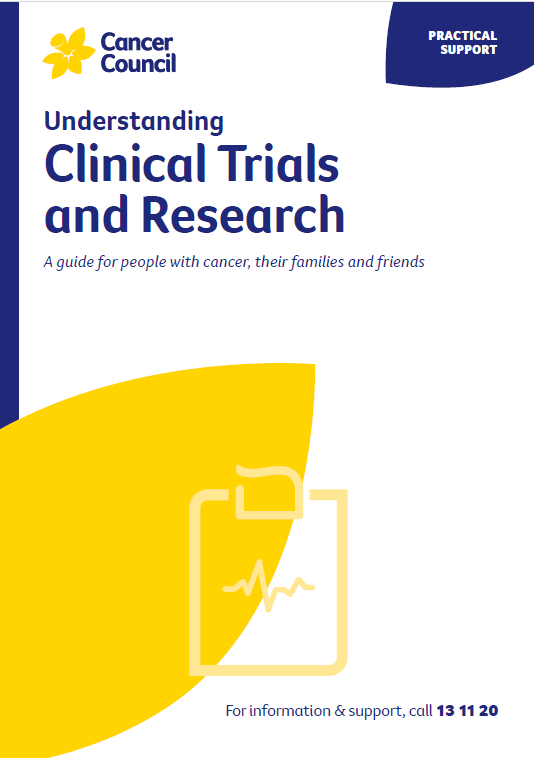- Home
- About Cancer
- Cancer treatment
- Clinical trials and research
- An overview of cancer research
An overview of cancer research
Cancer research has led to the medical treatments and health programs available today. These advances have improved outcomes for people with all types of cancer over the past 20 years, with increases in both length of survival and quality of life. The search for better ways to prevent, diagnose and treat cancer is ongoing.
Learn more about:
- The three main types of cancer research
- What is a clinical trial?
- The cycle of research
- Video: What are clinical trials?
What are the three main types of cancer research?
There are three main types of cancer research:
- population research – researchers known as epidemiologists look for patterns and trends to work out how and why cancers occur in groups of people (populations)
- laboratory research – scientists do experiments with the building blocks of disease, such as cells and blood, to try to understand how cancer works, and they also study and develop new drugs and treatments in the laboratory
- clinical research – research is done on people to better diagnose, prevent and treat cancer, often in a hospital or treatment centre.
Population research and laboratory research are often the starting point for clinical research, which may involve clinical trials.
What is a clinical trial?
A clinical trial can help show whether a new approach to prevention, screening, diagnosis or treatment works better than current methods and is safe. People volunteer to help test how well the new way works and if it causes side effects or other problems.
If the new way is shown to work better than the existing method, it may become available. Some clinical trials compare existing approaches to see which one is more effective. For more on this, see Clinical trials explained.
The cycle of research
The research process is a continuous cycle. People affected by cancer mainly take part in clinical trials, a type of clinical research. Research can lead to new and improved therapies becoming part of standard care.

Video: What are clinical trials?
In this video, Medical Oncologist Dr Elizabeth Hovey explains what clinical trials are and how they can improve cancer treatment.
Podcast: Making Treatment Decisions
Listen now
More resources
A/Prof Brett Hughes, Senior Staff Specialist, Medical Oncology, Royal Brisbane and Women’s Hospital and The Prince Charles Hospital, and Associate Professor, The University of Queensland, QLD; Christie Allan, Clinical Trials Lead, Cancer Council Victoria, VIC; Dawn Bedwell, 13 11 20 Consultant, Cancer Council Queensland, QLD; Joanne Benhamu, Senior Research Nurse, Team Lead, Lung, Colorectal and Palliative Care Trials, Parkville Cancer Clinical Trials Unit, Peter MacCallum Cancer Centre, VIC; Louise Dillon, Consumer; Sabina Jelinek, Clinical Nurse Research, St John of God Murdoch Hospital, WA; Chloe Jennett, Program Coodinator, Cancer Research, Cancer Council NSW; Carmel McCarthy, Consumer; Alison Richards, Research Unit Manager, Medical Oncology Clinical Trials Unit, Flinders Medical Centre, SA; Prof Jane Ussher, Translational Health Research Institute (THRI), School of Medicine, Western Sydney University, NSW; Prof Janette Vardy, Medical Oncologist, Concord Cancer Centre, and Professor of Cancer Medicine, The University of Sydney, NSW.
View the Cancer Council NSW editorial policy.
View all publications or call 13 11 20 for free printed copies.
Need to talk?
Support services
Coping with cancer?
Speak to a health professional or to someone who has been there, or find a support group or forum
Need legal and financial assistance?
Pro bono services, financial and legal assistance, and no interest loans
Cancer information
What is cancer?
How cancer starts and spreads
Cancer treatments
Learn about common cancer treatments, such as surgery, chemotherapy and radiation therapy


